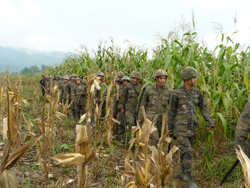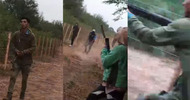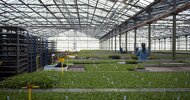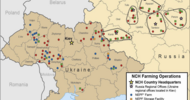Trócaire | 27 February 2014
Evicted families in Guatemala still face an uncertain future
by Aisling Walsh, Guatemala
Update on the Rio Frio community who were forcibly evicted off their land in the Polochic Valley to make way for a sugarcane plantation.
Driving through the lush green valley of Polochic in eastern Guatemala you could easily be fooled into thinking that you are crossing a natural paradise bursting with life.
However, row after row of regularly spaced palm trees stretching from the shores of Lake Izabal into the mountains of Alta Verapaz belies a more sinister reality.
They are plantations of African palm and sugar cane: the new frontier of resource exploitation and Polochic has them in abundance. The few remaining tracts of land where maize still grows between the plantations serve as a poignant reminder of all the productive farmland that has been lost since 769 indigenous Q’eqchi families were forcibly evicted from their land in 2011 to make way for the spread of the plantations that aim to feed the US and Europe's growing demand for biofuels.
Juana and Manuel Laj Ical, and their 10 children, were among the displaced families. Since 2011 they have been living at the edge of the village of 8 de agosto (8th of August) in shelters constructed by Trócaire, with support from Irish Aid, that were intended to serve as temporary housing while the Guatemalan government found alternative lands for them.
Three years later 14 families still remain at the site waiting desperately for the chance to settle permanently and begin farming maize and beans, the life source of the Q’eqchi people, once more.
When Aiden Gillen reported for Trócaire from 8 de agosto last year he spoke about the challenges faced by the community and the emotional and psychological trauma that Juana, her family and her community have suffered as a result of the violent evictions and the subsequent insecurity in the resettlement process.
A census was carried out by Trócaire and national organisations, the Guillermo Toriello Foundation (FGT), the IXIM Collective for Rural Studies and Committee for Unity for Campesinos (CUC) last April to assess the living conditions among the displaced communities.
It found that 54% of children from the evicted communities are suffering from chronic malnutrition and 2.5% were suffering from severe malnutrition. Most families are surviving on a diet of corn tortillas and bean and eat fewer than three meals a day.
They have little or no space to grow food, are often denied access to rivers for fishing and they are prevented from either working or renting new land by the same land-owners that evicted them.
The families continue to experience poor treatment and discrimination at health centres. Most children do not attend school, either because the schools refuse to enroll them, they face bullying, insults and discrimination from teachers and pupils, or the schools are simply too far away.
Trócaire recently visited 8 de agosto to see how Juana and Manuel and the other families were managing. Manuel and his youngest daughter Wilma are the only two members of the Ical family that have remained in 8 de agosto. They told us how conditions in the village continue to deteriorate: they cannot find work, receive only sporadic deliveries of corn meal, rather than whole maize, from the government, and they constantly fear that the few crops they have managed to grow will be destroyed.
They continue to experience threats of violence and only two weeks ago there was an attempted kidnapping of one of the children.
Three families will soon move from 8 de agosto to a new village of Sactela to live on land purchased by the government. However, Manuel continues to wait it out in 8 de agosto in the hope that he and his family will soon be included in one of the government's resettlement schemes.
Juana, no longer able to cope with the situation of constant insecurity in 8 de Agosto, has moved to a nearby village where one of her sons lives with his family. She has been able to rent a small house with the money she makes from the sale of hand-woven bags but still hopes that she and Manuel will eventually be able to live together again on their own plot of land.
Juana and Manuel are struggling to keep their family safe and healthy and their spirits alive in the face of multiple, and seemingly endless injustice.
Little by little families are abandoning 8 de agosto, and their hope of future in the Polochic valley, where land is now scarce and the possibilities of finding paid labour are minimal. While others feel they have nowhere else to go or they are unwilling to leave the valley that has been home to their communities for hundreds of years.
Hopes for resettlement
Trócaire has been supporting the families from the Polochic valley and national organisations such as FGT and CUC in negotiating with the government to provide new land for the evicted families.
In December 2013, 30 families were granted land and resettled in the newly created village of San Valentin and 110 more families are due to be resettled in the village of Sactela.
However, it became clear on visiting the newly formed community, ‘The Soldiers of St Stephen’ last week that government support has not stretched far beyond handing over the land. The 30 families were left without food or shelter for 20 days following the initial resettlement and now have to make do with basic shelters made from tin, plastic and wooden sticks.
While the community members said they were relieved to finally have their own land they expressed concerns about security and stability. They were still subject to threats from the plantation security guards and some community members still had standing arrests warrants.
Trócaire is continuing to work with our partners and the communities of Polochic in the negotiations for land and to provide support during the resettlement process.
European policy continues to fuel poverty, hunger and land grabbing in Guatemala
Despite overwhelming evidence that biofuels are neither socially nor environmentally sustainable, the European Union's Renewable Energy Directive, which sets a 10% target for renewable energy use in transport by 2020, accompanied by financial subsidies to support biofuel consumption, has been a serious driver of land grabs and food-price volatility, leading to further pressure on people’s access to land and water in developing countries.
The recent vote by the European Commission to decrease the biofuel quota for member states from 10% to 7% of all fuel consumption by 2020 does not go far enough to prevent further the displacement of families such as Juana and Manuel to make way for industrial scale growth of biofuel crops.
Evicted families in Guatemala still face an uncertain future
by Aisling Walsh, Guatemala
Update on the Rio Frio community who were forcibly evicted off their land in the Polochic Valley to make way for a sugarcane plantation.
Driving through the lush green valley of Polochic in eastern Guatemala you could easily be fooled into thinking that you are crossing a natural paradise bursting with life.
However, row after row of regularly spaced palm trees stretching from the shores of Lake Izabal into the mountains of Alta Verapaz belies a more sinister reality.
They are plantations of African palm and sugar cane: the new frontier of resource exploitation and Polochic has them in abundance. The few remaining tracts of land where maize still grows between the plantations serve as a poignant reminder of all the productive farmland that has been lost since 769 indigenous Q’eqchi families were forcibly evicted from their land in 2011 to make way for the spread of the plantations that aim to feed the US and Europe's growing demand for biofuels.
Juana and Manuel Laj Ical, and their 10 children, were among the displaced families. Since 2011 they have been living at the edge of the village of 8 de agosto (8th of August) in shelters constructed by Trócaire, with support from Irish Aid, that were intended to serve as temporary housing while the Guatemalan government found alternative lands for them.
Three years later 14 families still remain at the site waiting desperately for the chance to settle permanently and begin farming maize and beans, the life source of the Q’eqchi people, once more.
When Aiden Gillen reported for Trócaire from 8 de agosto last year he spoke about the challenges faced by the community and the emotional and psychological trauma that Juana, her family and her community have suffered as a result of the violent evictions and the subsequent insecurity in the resettlement process.
A census was carried out by Trócaire and national organisations, the Guillermo Toriello Foundation (FGT), the IXIM Collective for Rural Studies and Committee for Unity for Campesinos (CUC) last April to assess the living conditions among the displaced communities.
It found that 54% of children from the evicted communities are suffering from chronic malnutrition and 2.5% were suffering from severe malnutrition. Most families are surviving on a diet of corn tortillas and bean and eat fewer than three meals a day.
They have little or no space to grow food, are often denied access to rivers for fishing and they are prevented from either working or renting new land by the same land-owners that evicted them.
The families continue to experience poor treatment and discrimination at health centres. Most children do not attend school, either because the schools refuse to enroll them, they face bullying, insults and discrimination from teachers and pupils, or the schools are simply too far away.
Trócaire recently visited 8 de agosto to see how Juana and Manuel and the other families were managing. Manuel and his youngest daughter Wilma are the only two members of the Ical family that have remained in 8 de agosto. They told us how conditions in the village continue to deteriorate: they cannot find work, receive only sporadic deliveries of corn meal, rather than whole maize, from the government, and they constantly fear that the few crops they have managed to grow will be destroyed.
They continue to experience threats of violence and only two weeks ago there was an attempted kidnapping of one of the children.
Three families will soon move from 8 de agosto to a new village of Sactela to live on land purchased by the government. However, Manuel continues to wait it out in 8 de agosto in the hope that he and his family will soon be included in one of the government's resettlement schemes.
Juana, no longer able to cope with the situation of constant insecurity in 8 de Agosto, has moved to a nearby village where one of her sons lives with his family. She has been able to rent a small house with the money she makes from the sale of hand-woven bags but still hopes that she and Manuel will eventually be able to live together again on their own plot of land.
Juana and Manuel are struggling to keep their family safe and healthy and their spirits alive in the face of multiple, and seemingly endless injustice.
Little by little families are abandoning 8 de agosto, and their hope of future in the Polochic valley, where land is now scarce and the possibilities of finding paid labour are minimal. While others feel they have nowhere else to go or they are unwilling to leave the valley that has been home to their communities for hundreds of years.
Hopes for resettlement
Trócaire has been supporting the families from the Polochic valley and national organisations such as FGT and CUC in negotiating with the government to provide new land for the evicted families.
In December 2013, 30 families were granted land and resettled in the newly created village of San Valentin and 110 more families are due to be resettled in the village of Sactela.
However, it became clear on visiting the newly formed community, ‘The Soldiers of St Stephen’ last week that government support has not stretched far beyond handing over the land. The 30 families were left without food or shelter for 20 days following the initial resettlement and now have to make do with basic shelters made from tin, plastic and wooden sticks.
While the community members said they were relieved to finally have their own land they expressed concerns about security and stability. They were still subject to threats from the plantation security guards and some community members still had standing arrests warrants.
Trócaire is continuing to work with our partners and the communities of Polochic in the negotiations for land and to provide support during the resettlement process.
European policy continues to fuel poverty, hunger and land grabbing in Guatemala
Despite overwhelming evidence that biofuels are neither socially nor environmentally sustainable, the European Union's Renewable Energy Directive, which sets a 10% target for renewable energy use in transport by 2020, accompanied by financial subsidies to support biofuel consumption, has been a serious driver of land grabs and food-price volatility, leading to further pressure on people’s access to land and water in developing countries.
The recent vote by the European Commission to decrease the biofuel quota for member states from 10% to 7% of all fuel consumption by 2020 does not go far enough to prevent further the displacement of families such as Juana and Manuel to make way for industrial scale growth of biofuel crops.













